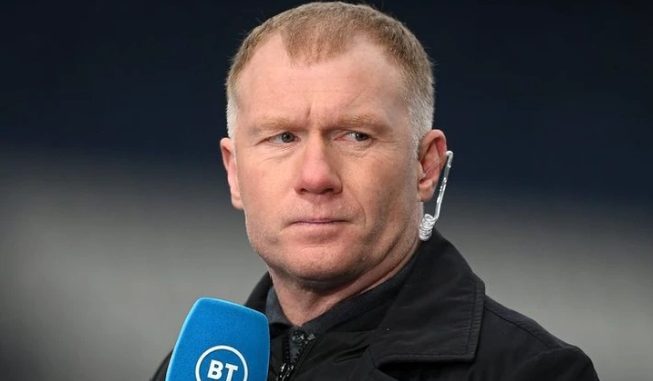
“Manchester United Knows How to Win Trophies, But Tottenham Hotspur Does Not,” – Paul Scholes
Manchester United legend Paul Scholes has never been one to mince words, and his latest comments have reignited a familiar debate in English football. Speaking on a recent football podcast, Scholes didn’t hold back when comparing his former club’s silverware pedigree to that of Premier League rivals Tottenham Hotspur. His statement—“Manchester United knows how to win trophies, but Tottenham Hotspur does not”—wasn’t just a dig; it was a reflection of a long-standing narrative about the gap in mentality and success between the two clubs.
Though Scholes’ words may appear provocative to some, they underline a truth that many football fans and pundits have acknowledged over the years: when it comes to turning potential into tangible success, few clubs are as experienced as Manchester United—and few have struggled with it as much as Spurs.
United’s Winning Culture
Paul Scholes is a man who knows what it takes to win. During his two-decade career at Manchester United, he amassed an astonishing 25 major trophies, including 11 Premier League titles and two UEFA Champions League titles. Under the stewardship of Sir Alex Ferguson, United became a machine—defined by grit, discipline, and an unyielding hunger for silverware.
“When you walked into that dressing room,” Scholes recalled, “winning was a demand. It wasn’t optional. You were either a winner or you weren’t at the club.”
That culture has historically separated United from many of their domestic rivals. While the post-Ferguson era has been rocky, the DNA of the club—its expectation to win and compete on all fronts—has remained intact. The club still boasts the highest number of English top-flight league titles (20) and has lifted major trophies as recently as 2023, when Erik ten Hag’s side captured the Carabao Cup.
Spurs: The Nearly Men?
In stark contrast, Tottenham Hotspur’s recent history has been one of promise and potential, often unfulfilled. Despite assembling squads brimming with talent—from Harry Kane and Heung-min Son to Luka Modrić and Gareth Bale in earlier years—Spurs have consistently fallen short when it matters most.
Their last major trophy came in 2008, when they won the League Cup. Since then, they’ve reached finals and semifinals in domestic and European competitions, including the Champions League final in 2019, only to come up short. For Scholes, the difference lies not just in results, but in mentality.
“Tottenham always have good teams, good players, even play attractive football,” he said. “But when it comes to delivering under pressure, they don’t have that winning mentality. At United, we were expected to win. At Spurs, it seems like it’s enough just to compete.”
The Mentality Gap
One of the core arguments behind Scholes’ comparison is the notion of a “winning mentality.” It’s a term often thrown around in football circles, but few articulate it better than someone who lived it.
Winning mentality is more than just wanting to win—it’s about showing up in big games, handling the pressure, and making the right decisions at crucial moments. It’s about not fearing failure but rising above it. In that regard, Manchester United, even in their transitional years, have shown more steel in the business end of competitions.
Tottenham, on the other hand, have earned an unfortunate reputation for crumbling in key moments. The 2015-16 Premier League season saw them in a title race with Leicester City, only to fall apart in the final weeks. In cup competitions, they’ve exited to lesser opposition or failed to turn leads into victories. Their recent FA Cup and Carabao Cup runs have all ended in disappointment.
The Harry Kane Era – A Wasted Opportunity?
Paul Scholes also touched on the Harry Kane era at Spurs as a prime example of wasted potential.
“They had one of the best strikers in the world for nearly a decade and didn’t build a trophy-winning team around him. That says everything,” Scholes remarked.
Indeed, Kane’s time at Spurs will always be viewed as bittersweet. Despite breaking club and national scoring records, the lack of trophies remains a glaring omission on his résumé. His recent move to Bayern Munich in 2023 was widely interpreted as an effort to finally achieve the team success that eluded him in North London.
Scholes’ point is echoed by many fans who believe Tottenham lacked the ruthless ambition needed to capitalize on Kane’s prime years. Whether it was failing to spend at the right time or sticking with managers past their expiration dates, the club always seemed one step away from greatness—and yet, always remained just out of reach.
Spurs Under Ange Postecoglou – A Culture Shift?
With the appointment of Ange Postecoglou, some believe a new culture is emerging at Tottenham. The Australian has brought a more attacking style of football and a sense of belief that had been lacking. Under him, Spurs have started to look more fearless, and their performances against big teams have shown flashes of resilience and hunger.
However, Scholes remains skeptical: “It’s early days. Spurs fans have seen good football before, but unless that turns into trophies, what’s the point?”
Postecoglou has insisted he’s building a project aimed at long-term success, not short-term results. That patience may be rewarded eventually, but in the high-stakes world of elite football, time is a luxury not always afforded.
Trophy Talk in Modern Football
In modern football, success is often judged by silverware. Clubs like Manchester United, Real Madrid, Bayern Munich, and Manchester City are defined by the honors they win, not just the football they play. Paul Scholes’ comparison is rooted in that reality.
Tottenham, for all their growth as a club in recent decades—their world-class stadium, training facilities, and commercial strength—still have one glaring void in their trophy cabinet. The fans feel it, the players feel it, and pundits like Scholes certainly feel it.
“I’m not saying Spurs are a bad club,” Scholes clarified. “They’ve done a lot of things right. But until they lift trophies, until they create that winning culture, they’ll always be seen as second-tier compared to the likes of United.”
Conclusion
Paul Scholes’ blunt assessment may ruffle feathers, particularly among Spurs supporters, but it highlights a truth that has long followed the North London club: competing is not the same as winning. Manchester United, despite recent inconsistencies, have a history and culture steeped in victory. Tottenham, meanwhile, are still chasing that elusive identity as winners.
Whether Ange Postecoglou can lead Spurs into a new era and silence critics like Scholes remains to be seen. But until the trophies arrive, the debate will rage on—and Scholes, never shy about speaking his mind, will likely remain one of its loudest voices.
—
Would you like this
formatted for a blog or sports news site with subheadings and images?

Leave a Reply